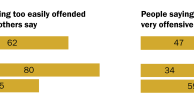Americans are somewhat more likely to disapprove than approve of the Biden administration’s response to the Israel-Hamas war: 41% of U.S. adults disapprove, 35% approve and about a quarter (24%) say they are not sure.
However, these views vary substantially by age, partisanship and the degree to which people are following news about the war.
Age
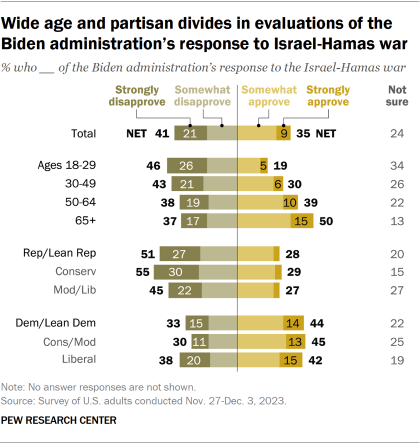
Older Americans are both more likely to have an opinion about and to approve of the Biden administration’s response to the war than younger Americans.
Half of those 65 and older approve of the administration’s response, while 37% disapprove and just 13% say they are unsure. By comparison, evaluations are more evenly split among those ages 50 to 64 (39% approve, 38% disapprove).
There is more disapproval than approval of the administration’s response among adults under 50, and particularly those under 30. By more than two-to-one, adults under 30 disapprove (46%) rather than approve (19%) of the administration’s response, with about a third (34%) saying they are not sure.
Partisanship
On balance, Democrats and those who lean to the Democratic Party are more likely to approve than disapprove of the administration’s response (44% approve, 33% disapprove), while the reverse is true among Republicans and GOP leaners (28% approve, 51% disapprove).
Still, views of the Biden administration’s response are not strictly partisan: A third of Democrats disapprove of the administration’s response, while about three-in-ten Republicans approve of it (28%).
Age among Democrats
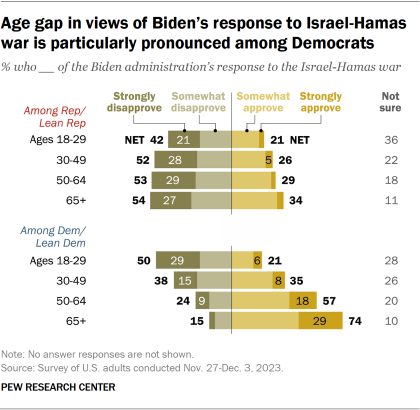
While younger Democrats are more likely than older Democrats to be unsure in their views of the Biden administration’s response, half of those ages 18 to 29 disapprove. About two-in-ten (21%) approve, and roughly three-in-ten (28%) aren’t sure.
By comparison, those ages 30 to 49 are about evenly divided in their views (35% approve, 38% disapprove). Democrats 50 to 64 are more likely to approve than disapprove (57% vs. 24%), and those 65 and older are most likely to approve of the administration’s response in comparison (74% approve, just 15% disapprove).
Age among Republicans
Among Republicans of all age groups, there is more disapproval than approval of the Biden administration’s response to the war. However, older Republicans are much more likely than younger Republicans to offer an opinion about this.
Attention to the war
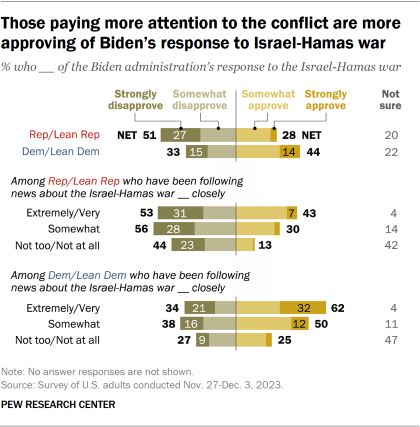
Views about the administration’s response to the Israel-Hamas war vary by how closely people have been following news about the war, with close followers being both more likely than others to have an opinion and to approve of the administration’s response.
While Republicans are more likely to disapprove than approve of the Biden administration’s response regardless of their level of attention to the conflict, evaluations of the response are more positive among those who are paying closer attention. About four-in-ten (43%) of those who follow news about the war extremely or very closely approve of the response, while 53% disapprove.
By comparison, among Republicans who say they are following news about the war somewhat closely, the balance of opinion is more negative. They are about equally likely as close followers to disapprove of the administration’s response (56% say this), while a smaller share (30%) approve of the administration’s response. (Those paying less attention are less likely to offer an opinion of the administration’s response.)
And while 42% of Republicans who are not following news about the conflict do not offer an opinion, those who do disapprove of the Biden administration’s response by at least three-to-one (44% disapprove, 13% approve).
The pattern is similar among Democrats. Democrats who follow news about the war extremely or very closely are 28 percentage points more likely to approve than disapprove of the administration’s response (62% vs. 34%), while those who only somewhat follow the news approve by a narrower margin (50% vs. 38%). Those who do not follow the news closely are about evenly divided in their approval, although nearly half (47%) are not sure.
Is Biden favoring Israelis, Palestinians or striking the right balance?
While about four-in-ten Americans (38%) are unsure about whether they think Joe Biden is favoring one side, they are slightly more likely to say Biden is favoring Israelis too much (21%) than to say this about Palestinians (16%). A quarter say Biden is striking the right balance.
Age
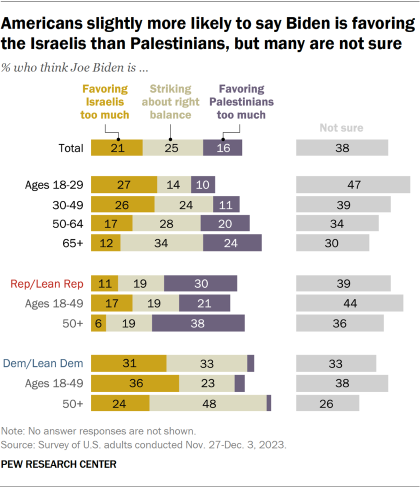
About a quarter of Americans under 50 (27%) say Biden is favoring Israelis too much. Older Americans are less likely to say this (17% among those ages 50 to 64 and just 12% among those 65 and older).
In contrast, older Americans are more likely than younger Americans to say Biden is favoring Palestinians too much: 24% of those 65 and older say this, as do 20% of those 50 to 64. This falls to just 10% among adults under 50.
Older Americans are also more likely than younger Americans to say Biden is striking the right balance, while younger Americans are less likely to offer an opinion.
Party
Republicans (30%) are far more likely than Democrats (3%) to say Biden is favoring Palestinians too much, while Democrats are more likely than Republicans to say Biden is favoring Israelis too much (31% vs. 11%). In both parties, younger adults are more likely than older adults to say Biden is favoring Israelis too much.

